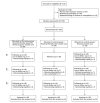Effects of a WeChat-Based Life Review Program for Patients With Digestive System Cancer: 3-Arm Parallel Randomized Controlled Trial
- PMID: 36006665
- PMCID: PMC9459832
- DOI: 10.2196/36000
Effects of a WeChat-Based Life Review Program for Patients With Digestive System Cancer: 3-Arm Parallel Randomized Controlled Trial
Abstract
Background: Patients with digestive system cancer often experience psychospiritual distress. Life review is an evidence-based psychological intervention for patients with cancer, but the effects of digital life review programs are unclear, especially for patients with digestive system cancer.
Objective: We examined the effects of a WeChat-based life review program on the psychospiritual well-being of patients with digestive system cancer.
Methods: This study was a 3-arm parallel randomized controlled trial. Eligible patients with digestive system cancer were recruited from a university hospital in Fujian, China. They were randomized to a life review group and 2 control groups. All participants received routine care, and the life review group also received the 4-week WeChat-based life review program. Control group 1 also received a 4-week program of friendly visiting. Anxiety, depression, hope, and self-transcendence were measured at baseline and 2 days, 1 month, and 6 months after the intervention.
Results: A total of 150 participants were randomly allocated to the WeChat-based life review group (n=50), control group 1 (n=50), or control group 2 (n=50). The overall dropout rate was 10% (15/150), and 92% (46/50) of participants in the the life review group completed the intervention. Significant interaction effects for time and group membership were found for anxiety (P<.001), depression (P<.001), hope (P<.001), and self-transcendence (P<.001) at all follow-up time points. For anxiety and depression, the scores did not differ significantly between the life review group and control group 1 on day 2 (P=.80 for anxiety, P=.51 for depression), but the scores were significantly lower in the life review group at month 1 and month 6 (P=.02 for anxiety at both months 1 and 6; P=.003 and P<.001 for depression at months 1 and 6, respectively). Significant increases in hope and self-transcendence were revealed in the life review group compared to control group participants at all follow-up sessions.
Conclusions: The WeChat-based life review program was effective in reducing anxiety and depressive symptoms and in improving the level of hope and self-transcendence among patients with digestive system cancer. Though friendly visiting can also help to relieve anxiety, its effects are short-term.
Trial registration: Chinese Clinical Trial Registry ChiCTR-IOR-17011998; https://tinyurl.com/5acycpd4.
Keywords: anxiety; cancer; depression; digestive system; digestive system cancer; digital technology; distress; hope; life review; psychological; randomized controlled trial; self-transcendence.
©Meihua Zheng, Xiaoling Zhang, Huimin Xiao. Originally published in the Journal of Medical Internet Research (https://www.jmir.org), 25.08.2022.
Conflict of interest statement
Conflicts of Interest: None declared.
Figures


Similar articles
-
Evaluation of a WeChat-based life review programme for cancer patients: A quasi-experimental study.J Adv Nurs. 2019 Jul;75(7):1563-1574. doi: 10.1111/jan.14018. Epub 2019 May 16. J Adv Nurs. 2019. PMID: 30950535
-
Effects of remote dignity therapy on mental health among patients with hematologic neoplasms and their significant others: A randomized controlled trial.Int J Nurs Stud. 2024 Mar;151:104668. doi: 10.1016/j.ijnurstu.2023.104668. Epub 2023 Dec 6. Int J Nurs Stud. 2024. PMID: 38211363 Clinical Trial.
-
Effectiveness of an Internet-Based Acceptance and Commitment Therapy Intervention for Reducing Psychological Distress in Health Care Professionals: Randomized Controlled Trial.J Med Internet Res. 2024 Dec 18;26:e59093. doi: 10.2196/59093. J Med Internet Res. 2024. PMID: 39693127 Free PMC article. Clinical Trial.
-
Telephone interventions for symptom management in adults with cancer.Cochrane Database Syst Rev. 2020 Jun 2;6(6):CD007568. doi: 10.1002/14651858.CD007568.pub2. Cochrane Database Syst Rev. 2020. PMID: 32483832 Free PMC article.
-
The effectiveness of dignity therapy on hope, quality of life, anxiety, and depression in cancer patients: A meta-analysis of randomized controlled trials.Int J Nurs Stud. 2022 Aug;132:104273. doi: 10.1016/j.ijnurstu.2022.104273. Epub 2022 Apr 28. Int J Nurs Stud. 2022. PMID: 35635908 Review.
Cited by
-
Digital Storytelling for People With Cognitive Impairment Using Available Mobile Apps: Systematic Search in App Stores and Content Analysis.JMIR Aging. 2024 Oct 24;7:e64525. doi: 10.2196/64525. JMIR Aging. 2024. PMID: 39446478 Free PMC article.
-
Improving Parental Health Literacy in Primary Caregivers of 0- to 3-Year-Old Children Through a WeChat Official Account: Cluster Randomized Controlled Trial.JMIR Public Health Surveill. 2024 Jul 4;10:e54623. doi: 10.2196/54623. JMIR Public Health Surveill. 2024. PMID: 38989817 Free PMC article. Clinical Trial.
-
Digital Storytelling Intervention for Enhancing the Social Participation of People With Mild Cognitive Impairment: Co-Design and Usability Study.JMIR Aging. 2024 Jan 17;7:e54138. doi: 10.2196/54138. JMIR Aging. 2024. PMID: 38231541 Free PMC article.
-
The effectiveness of reminiscence therapy on anxiety, depression, and quality of life in adult cancer patients: a systematic review and meta-analysis.Support Care Cancer. 2024 Oct 15;32(11):728. doi: 10.1007/s00520-024-08920-6. Support Care Cancer. 2024. PMID: 39402338
-
Effects of a reminiscence therapy-involved program on anxiety, depression, and the quality of life in cancer patients: a meta-analysis of randomized controlled trials.Front Psychol. 2024 Sep 17;15:1408941. doi: 10.3389/fpsyg.2024.1408941. eCollection 2024. Front Psychol. 2024. PMID: 39355296 Free PMC article.
References
-
- Sung H, Ferlay J, Siegel RL, Laversanne M, Soerjomataram I, Jemal A, Bray F. Global Cancer Statistics 2020: GLOBOCAN Estimates of Incidence and Mortality Worldwide for 36 Cancers in 185 Countries. CA Cancer J Clin. 2021 May;71(3):209–249. doi: 10.3322/caac.21660. doi: 10.3322/caac.21660. - DOI - DOI - PubMed
-
- Fu J, Zeng Y, Tan Y, Fu B, Qiu H. Effects of hospice care on quality of life and negative emotions in patients with advanced tumor: A protocol for systematic review and meta-analysis. Medicine (Baltimore) 2020 Jul 02;99(27):e20784. doi: 10.1097/MD.0000000000020784. doi: 10.1097/MD.0000000000020784.00005792-202007020-00040 - DOI - DOI - PMC - PubMed
-
- Connolly M, Timmins F. Spiritual Care for Individuals with Cancer: The Importance of Life Review as a Tool for Promoting Spiritual Well-Being. Semin Oncol Nurs. 2021 Oct;37(5):151209. doi: 10.1016/j.soncn.2021.151209. https://linkinghub.elsevier.com/retrieve/pii/S0749-2081(21)00116-9 S0749-2081(21)00116-9 - DOI - PubMed
Publication types
MeSH terms
LinkOut - more resources
Full Text Sources
Medical

